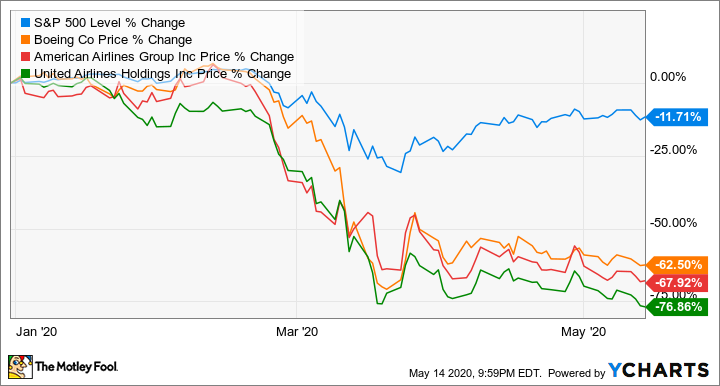Boeing (BA +0.42%) CEO David Calhoun caused a stir when he predicted a "major" U.S. airline would go out of business as a result of the COVID-19 pandemic. Right or wrong, Calhoun's comments reportedly ruffled a lot of feathers in the airline industry, and Boeing and Calhoun are apparently now scrambling to walk back the statements as a result.
In the days since, Calhoun and Boeing have been fielding calls from airline executives including calls from United Airlines Holdings and American Airlines Group, according to a Wall Street Journal report.
Airlines have been hit hard by the pandemic, with shares of American and United down 67% and 76% year to date, respectively. The carriers are all attempting to avoid running out of cash. The ability of these businesses to raise cash depends in part on counterparties, including lenders and potential investors, believing the businessses can and their abilities to raise fresh capital rely in part on counterparties like lenders and stock buyers having faith that bankruptcy can be avoided. Comments by a figure as prominent as Calhoun can have a chilling effect on markets, making the airlines' already daunting challenge even more difficult.
Boeing and Airbus enjoy a global duopoly in plane sales, and in a business with two sellers and just a handful of buyers, individual relationships matter for getting deals done. Boeing needs to quickly patch relations, or else risk hard feelings that linger well after the pandemic is gone.
Three times a trend?
Calhoun has been CEO only since December, but during his short time in charge he has gained a reputation for speaking off the cuff.
The CEO in an early March interview with the New York Times was critical of his predecessor, Dennis Muilenburg, saying Muilenburg pushed too fast with new plane development and made other risky bets that have endangered Boeing's reputation.
"If anybody ran over the rainbow for the pot of gold on stock, it would have been him," Calhoun said of Muilenburg, adding that the number of challenges the current CEO now faces "speaks to the weakness of our leadership."

Image source: Boeing.
He retracted those comments soon after, saying "I am both embarrassed and regretful about the article," but Boeing lawyers could be revisiting the statements for years to come if they are used by plaintiffs' attorneys and victims' families in litigation concerning a pair of fatal 737 MAX crashes.
The remarks also seemed odd coming from an executive who prior to becoming CEO had served on the company's board since 2009, and presumably had some oversight responsibility.
In late March, Calhoun raised eyebrows again during an appearance on Fox Business when he lobbied for the aerospace industry to be part of a government bailout, but said he might reject the aid if it came with onerous conditions like a requirement to issue warrants to the government.
"If you attach too many things to it, of course you take a different course," Calhoun said.
The comments, made in a climate where public perception of Boeing had already taken a hit due to the 737 MAX grounding and subsequent investigations, attracted backlash on social media, in the financial press, and among some lawmakers.
Does it matter for shareholders?
It's worth noting that Calhoun's comments on bailouts proved to be correct. While airlines were forced to issue warrants and accept some loans instead of subsidies in order to access $50 billion in government support, Boeing instead was able to raise $25 billion in a private debt offering. A day later, it announced it would not seek bailout funds.
In time Calhoun might also be proven right on the topic of airlines. While I am optimistic the entire industry has the cash to survive assuming traffic begins to return by late summer, that is far from a given.
Regardless, Boeing shareholders would be well served if Calhoun could learn to bite his tongue. The private equity and General Electric veteran faces a multiyear turnaround at Boeing, and following the 737 MAX debacle, the company should be focused on restoring its reputation, not picking fresh battles.
Ultimately it might not really matter. Boeing's fortunes, and its stock price, will get a lift when commercial airplane sales recover. And when airlines are ready to buy again, Boeing is sure to do well, even if there is some lingering anger among airline execs.
But given all the problems Boeing faces, the least Calhoun could do for investors is try to avoid adding one more to worry about.







